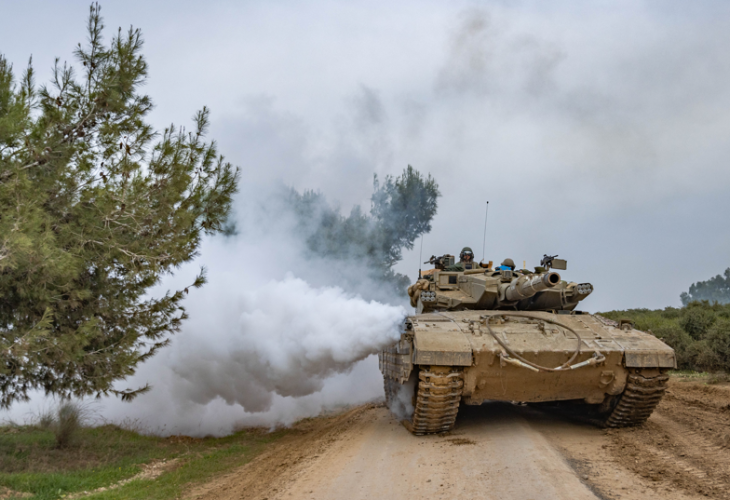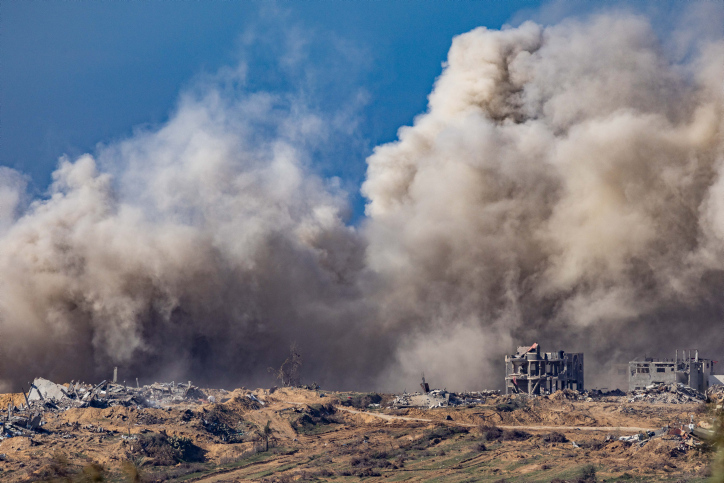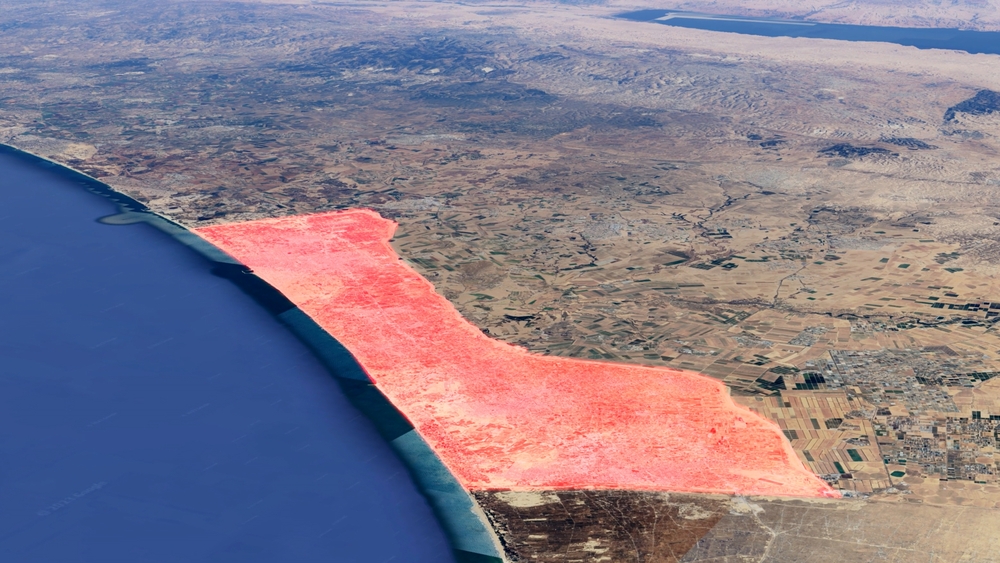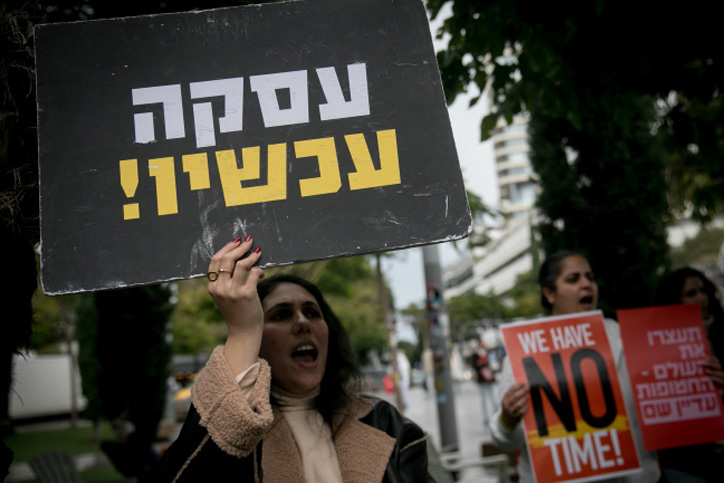Perspectives on the Ongoing Gaza Conflict: Insights from Retired Generals Gershon Hacohen and Uzi Dayan
Retired Israeli military leaders offer contrasting views on the ongoing conflict in Gaza. In interviews, Generals Gershon Hacohen and Uzi Dayan share their perspectives on Israel's military strategy.
 (Photo: Chaim Goldberg/Flash 90)
(Photo: Chaim Goldberg/Flash 90)Over 120 days have passed since the horrific attack by Hamas militants on Israeli settlements during Simchat Torah. Israel has been responding consistently, with the IDF penetrating deep into Gaza, places untouched by Israeli forces for two decades.
Alongside courageous battles fought by IDF soldiers throughout Gaza, from the alleys of Khan Yunis to the outskirts of Shati, the nature of combat now differs significantly from when the ground maneuver started. Instead of a large military presence, smaller forces are now engaged after some were relieved for rest.
In our conversation with Major General (res.) Uzi Dayan, former Deputy Chief of Staff and current head of the "Forum for National Commanders," he believes scaling back forces is a strategic misstep for Israel: "I think the war in Gaza is stagnating."
Is there any situation that justifies reducing forces?
"The only reason I can accept for pulling forces out of Gaza is to redirect them to the northern front," he states. Otherwise, reducing forces poses problems: "Raids are conducted only in conquered territories. Until we complete the mission of capturing all of Gaza, including cutting off the Philadelphi Route, there is no justification for reducing or withdrawing forces. Generally, you can't control Gaza solely through raids; they work only for specific stages or areas and not before you capture the entire territory."
On the other hand, Major General (res.) Gershon Hacohen, who also held senior positions in the IDF, addresses public disputes: "I believe there's logic in the current combat management. It's important to understand that the public doesn't grasp military strategy, and unfortunately, it's not well explained to them." Hacohen criticizes press briefings for providing insufficient public answers, exacerbating civilians' lack of knowledge. He suggests instead "talking straightforwardly, explaining this is a prolonged war that won't resolve overnight. I actually think the military's steps are correct."
"Take, for example, the conflict between Azerbaijan and Armenia," Hacohen explains, "They've fought several times recently. Just three years ago, they agreed on a ceasefire, but four months ago, Azerbaijan launched a war that expelled Armenia from the disputed Nagorno-Karabakh region in just one day. This teaches us that in war, strategic vision is crucial, and Israeli public opinion on reducing forces stems from impatience. Our enemies show patience, and that's the game."
"Gaza is a Fortress Unlike Any Other"
Like most Israelis, Major General Dayan was caught by surprise by the Hamas attack during Simchat Torah. Yet, he was also surprised by the IDF's ground maneuver into Gaza. He claims, "The nature of Israel's operations at the outset was mistaken. Immediately, Israel should have severed Gaza from Egypt by capturing the Philadelphi Route and dividing Gaza into three parts."
Dayan argues, "Now we should expedite the war, not withdraw fighters from Gaza. Understand that the war's outcome in Gaza will ultimately impact the northern front and Judea and Samaria. A clear Israeli victory will send a decisive message to our friends and foes across the Middle East. Therefore, accelerating IDF operations in Gaza is essential."
What should Israel achieve from the war ultimately?
"When we say we must dismantle Hamas, it means destroying the organization's leadership and severely damaging its capabilities," emphasizes Dayan. "Israel's goal should be to conquer the entire strip. Ultimately, winning the war also entails not allowing Hamas to return. Since Hamas is an idea rooted in many, with widespread support in Gaza, the only way to eradicate it is by destroying its leadership and dismantling its infrastructure."
Hacohen believes "victory is difficult to define. Take, for example, the Yom Kippur War. To some extent, Sadat could tell his people they won, even though military victory wasn't achieved. Israel's military success led to withdrawal from Sinai, sparking peace fantasies."
He continues, "One of life's great truths is that it isn't mathematics, and you can't predict the outcomes of actions until they're apparent. Similarly, war isn't an engineering project. The goal can be to reach a specific point, but it's beneficial for initial target direction. We see how the Russians understood this in Ukraine. They manage the war wisely, despite failing to defeat Ukrainians quickly, as initially expected. This means setting objectives at war's start and adapting strategies to ground realities."
How weakened is Hamas?
"Hard to know. We might have to keep fighting for years, as our history reveals," says Hacohen. "In the Bible, King David fought the Philistines, yet Israel had to battle again later, proving wars don't necessarily resolve conflicts permanently."
 (Photo: Chaim Goldberg/Flash 90)
(Photo: Chaim Goldberg/Flash 90)"Egypt Plays a Double Game. Israel Can't Rely on It"
What about capturing the Philadelphi Route?
Dayan: "If Gaza's border with Egypt remains open, Hamas will return. Remember, part of the terror organization's strength was built via the southern border."
Hacohen: "The Philadelphi Route allowed a plethora of weaponry, including tunnel-building capabilities, into Gaza. Local production has limits, and building the vast terror infrastructure required many raw materials, whether for rockets or tunnel construction."
"The Philadelphi Route is also the main exit from Gaza," adds Hacohen. "Many Hamas fighters trained in Iran, using the route to reach and depart from the strip. Hence, there's concern about kidnapping and senior Hamas officials escaping via this route."
 (Photo: shutterstock) Gaza Strip, October 2023 - Satellite View
(Photo: shutterstock) Gaza Strip, October 2023 - Satellite ViewHacohen: "Operationally, Israel can do it. The main challenges are diplomatic. Around Rafah, about a million people reside, some refugees on the city's streets. Additionally, Egyptians oppose Israeli control of the route. There are sensitivities, but I believe the IDF can overcome them."
Dayan: "Israel can't rely on Egypt for border security with Gaza. They play a double game."
Why does Egypt oppose Israeli control of the Philadelphi Route?
Dayan: "They probably fear exposure of what occurred there over the years. Also, Egyptians don't want to control Gaza but desire a border with it for power and influence. Above all, Egypt's hostility towards Israel fuels their opposition, alongside hoping Israel weakens in its fight against Hamas." However, Dayan argues, "Israel shouldn't heed Egyptian arguments since it's Hamas-controlled territory, not Egyptian soil."
Discussions about a hostage return deal are ongoing. Is military pressure or negotiation the way to free them?
Dayan: "The more we exert military pressure on terror organizations, the closer we get to retrieving the hostages. These missions—military and hostage-release—complement each other."
 (Photo: Miriam Alster/Flash 90)
(Photo: Miriam Alster/Flash 90)"We are already at war with Hezbollah," emphasizes Dayan, noting, "The minimum achievement up north is establishing a roughly 10-kilometer security zone — the range of new anti-tank missiles. This means the area north of the Litani River must be depopulated. Anyone present there is at personal risk. Otherwise, we cannot assure civilian safety in the north. Additionally, we need an army between communities and the enemy, a lesson from the Simchat Torah events where militants entered villages near the fence."

